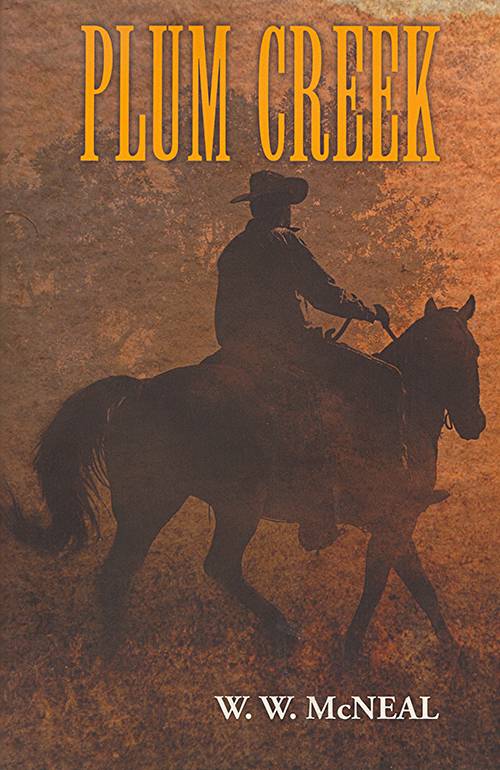Back in the Sadle Again

Plum Creek: a Novel
by W.W. McNeal
Fort Worth: Texas Christian University Press, 2016.
320pp. $22.95 paper.
Reviewed by
Joe McDade
This is the book W.W. McNeal was born to write. A retired trial lawyer, living on land that has been in his family since 1850, McNeal took a lifetime’s worth of reading, research and anecdotes and brought forth his first novel, Plum Creek, a western that evokes, as well as any book could, the cruelty of both the land and the men (not to mention a few women) in the Texas of Reconstruction.
At times, Plum Creek seems to be five books at once, and that is meant as a compliment. The various plots are set in motion when local legend Wesley McCullough “accidentally hung himself from the forked branch of a tree.” At the funeral and wake, so many characters arrive that the reader may feel like a guest at a quintessential Texas Sunday barbecue featuring extended kin and long-lost second cousins; the introductions alone prompted at least one reader to flip back multiple times, if only to note the number of females whose first name begins with “L.” Soon, however, as the various plots assert themselves, the players take their places, and the book takes off.
The main spine of the narrative starts with one of the mourners, Jack Hays—who, like many characters in the book, is either a facsimile of or based on an actual historical figure, in this case Jack Coffee Hays, the legendary Texas Ranger and (in this narrative, anyway) a former colleague of Wesley McCullough’s. McNeal’s Hays is clearly not a man to be trifled with; in the simple act of removing his hat, his very silence seems to give off a rumble. After paying his respects to his old colleague, Hays announces his reason for his presence in the Hill Country. In a development perhaps a bit too reminiscent of the John Wayne film The Searchers, a “half-breed” Comanche has kidnapped Hays’s niece after slaughtering her family. A few days after his old friend is interred, Hays assembles a posse and heads off to hunt down the renegade and rescue his niece.
Within this plot lies another, the coming of age of sixteen-year-old Billy McCullough, Wesley’s soon, who asks to accompany Hays and, in doing so, experiences something only slightly akin to those storybooks for boys that might be entitled The Summer I Grew Up. However, McNeal makes this part of the tale something else entirely, by stripping bare the story of all sentiment and thrusting Billy into a life that, by its very nature, is nasty, brutish, and short. By the end, it is not clear whether the enemy or simply the world around him that poses a worse threat.
Billy’s coming-of-age is as moral as it is physical. Aside from the rigor of the journey and the care he takes for his equine friend, there are observations about a world that, in the aftermath of the Civil War, is changing so fast the old assumptions are quickly becoming unthinkable. Billy is sixteen-years old and the novel takes place in 1869, which means that Billy has conscious memories not just of the war but a time when men and women could be held in chains and as chattel. That time is gone, and many of those still remaining had yet to come around. Billy muses, “It was as if his grandfather was stuck in a particular time and space and the world was moving on.”
The subplots back home, far from a distraction, actually provide a nice resting spot between bouts of Hays’s Ahab-like monomania. These provide not slivers of frontier lore but a bit of whimsy as well. For instance, everyone was familiar with Wesley McCullough’s love affair with whiskey, so when a new holographic will shows up (giving his mistress, not his wife, controlling interest in his mill) the question becomes not was Wesley drunk when he hand-wrote his will (he wrote it, naturally, at his favorite saloon), but how drunk? Passed out? Did he hold the pen in his own hand? How many witnesses? Secret political deals are struck in private hotel rooms over glasses of bourbon, and with such verisimilitude there will be no question whence came Lyndon Johnson and “Pa” Ferguson.
W.W. McNeal waited a long time to give us his first novel. Hopefully, less time will pass before his second.
Joe McDade is a professor of composition and American Literature of English at Houston Community College. He also lectures on English Composition at the University of Houston
